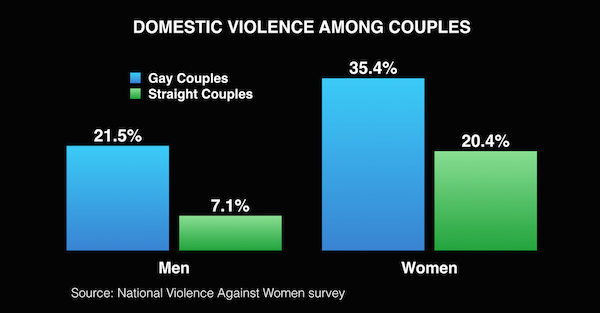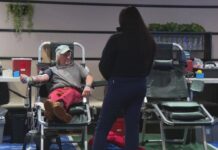LGBTQ Couples are being left out of the DV conversation – so lets change it!
Vice President Joe Biden spoke this week on the Ray Rice domestic violence incident that got him bounced from the Baltimore Ravens and maybe permanently from the NFL.
Biden said “It [domestic violence] is never, never, never a woman fault. No man has a right to raise his hand to a woman.”
Biden’s words are just an example of the parade of elected officials that called out the NFL this week on their horrendous response to the Ray Rice situation.
I agree.
No man has the right to raise his hand to a woman. Wholeheartedly, I believe that.
However, as a lesbian who has been dating women for 20 years, I also believe a woman does not have a right to raise her hand to another woman to whom she is dating or married.
Similarly, I do not think that a man has the right to raise a hand to another man with whom he is intimately involved.
This past week was also the 20th anniversary of the Violence Against Women Act that Biden helped craft when he was a Delaware’s Senator.
It was groundbreaking legislation for its time.
However, its time for an update to include our community — and it starts with us speaking up about the issue when Ray Rice type situations arise. Domestic Violence is the ugly side of the LGBTQ movement.
The subject of LGBTQ domestic violence is one a lot of people do not like or want to talk about. Those brave few, like the lesbian domestic violence agency, The Network/LA Red, and the Gay Men’s Domestic Violence Project endeavor to bring this issue to light in Massachusetts and nationally.
Their respective leaders Leventhal and Curt Rogers, have been banging this drum for some time — at least over two decades. But somehow, when sports stars punch out their wives in Atlantic City casinos or Alec Baldwin loses it on a New York street, its front page news.
Women’s rights advocates and politicians step to podiums and decry domestic violence — and they should! But, why do we never hear about the LGBTQ domestic violence problems from our LGBTQ stars? Where are the soapboxes, protest signs and indignant interviews with advocates? LGBTQ domestic violence is and remains practically invisible because we rarely shine a light on it.
Some might think — “Well, its not a big deal. We go to parties and are fabulous — we don’t hit each other.”
Wrong.
From a September 4 article in The Advocate, the figures for LGBTQ domestic violence versus straight couples is staggering:
“The National Violence Against Women survey found that 21.5 percent of men and 35.4 percent of women living with a same-sex partner experienced intimate-partner physical violence in their lifetimes, compared with 7.1% and 20.4% for men and women, respectively, with a history of only opposite-sex cohabitation. Transgender respondents had an incidence of 34.6 percent over a lifetime according to a Massachusetts survey.
The CDC’s 2010 National Intimate Partner and Sexual Violence Survey, released again in 2013 with new analysis, reports in its first-ever study focusing on victimization by sexual orientation that the lifetime prevalence of rape, physical violence, or stalking by an intimate partner was 43.8 percent for lesbians, 61.1 percent for bisexual women, and 35 percent for heterosexual women, while it was 26 percent for gay men, 37.3 percent for bisexual men, and 29 percent for heterosexual men (this study did not include gender identity or expression).”
These are staggering statistics.
We need to hold our politicians accountable for when they decry domestic violence – that they speak out for every couple – not just the status quo. If we don’t, we will not shine a light on this problem and get the funding and programming our community needs in order to address this problem.
We need funding for emergency and permanent shelters for victims and families, assistance programs for victims and their children, safety planning and crisis intervention.
Also, we need training curriculum and trainers for police departments nationwide who are often the first line of defense for victims. Police are notoriously bad for handling LGBTQ relationship violence and only through comprehensive training will that change. We also need changes in domestic violence and stalking laws that reflect protections for people in all types of relationships. If the law doesn’t reflect us, it cannot help us.
Like I said, I have been dating women for over 20 years and have been on the receiving end of some violence. I’ve had relationships where the person I dated keyed my car from stem to stern, harassed me at work and almost got me fired, and tried to block the door to prevent me from leaving. I got out. No one is allowed to treat me that way.
Our society is changing for the better and the LGBTQ community is becoming more and more accepted all across our country. However, we still have to endeavor to keep ourselves visible in all conversations about relationships and families — especially domestic violence.
So, hold your elected officials accountable to all types of couples. Bring LGBTQ relationships into conversations when you are discussing Ray Rice and his wife and what a poor response the NFL had to the situation.
Make our community visible everywhere — no matter how tough the subject matter.










